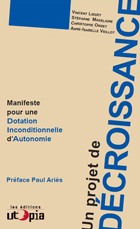
Fourty years after the publication of the famous report Limit to Growth (Halte à la croissance)[1] presented at the Club of Rome, Dennis Meadows – co-author of the report – was visiting Paris at the end of May. And he confirmed and said: “World growth is about to stop” in Le Monde[2] or “We haven’t put an end to world growth, nature will take care of it”, in Terra Eco.[3]
As Growth objectors, we can only agree with Meadows’ diagnosis, which confirms the first report’s perspectives [4], this type of discourse bears the blames we direct to the radical “greenies” since it stops at being a catastrophist lament.
In fact, as Dennis Meadows, among others, has spent fourty years of his life saying that everything was doomed, to rehash it again and again implying that the rest of us would not understand or…would not want to understand.
Finally, Meadows failed, since he had the right ideas, but he was all wrong on the form. In Paul Ariès’ words: “ f it was enough to be politically right, we would have heard about it!”.
But being right is not enough, what matters is to send the message and convey the ideas but to pretend to be “smarter” or to treat others as idiots, doesn’t contribute to a better understanding.
That is why, even though we are interested in the physical limits of this growth society, we believe it is important to reflect on its cultural dimensions[5] by making the project desirable, by thinking about a political, cultural, social and psychological construction of serene transitions towards sustainable, and about all, desirable societies.
To say everything is doomed is one thing….but not proposing something is another one and the same applies to many “enlighten catastrophists”.
We propose to experiment with different strategies[6] since human beings are not rational and prefer denial to challenge.
Let’s try dialogue, intelligence, desirability, networks, conviviality, building together, concrete experimentations etc…..instead of enlighten catastrophism, “preachy” tone, rehashing etc….
Let’s favour the “even so”, rather than the “we must”.
When people don’t want to understand, hitting them harder on the head won’t make them understand better …..
Above all Degrowth is an emancipation from constraining and stressful work, frustrating consumption, of the numbing show-off society, it is the reappropriation of a dignified and convivial society. Degrowth, means more time, more networks, more culture, more autonomy, more democracy and most of all, finally, the reappropriation of the meaning we want to give to our lives: what do we produce? How? For what purpose?
Degrowth is “buen vivir” (Living well)!
And this is spot on since it is consistent with a necessary, but also desirable, transition in order to avoid the wall invoked by Meadows and others!
[2] http://www.lemonde.fr/planete/article/2012/05/25/la-croissance-mondiale-va-s-arreter_1707352_3244.html
[4] ‘As Elodie Vieille Blanchard’s thesis demonstrates, Meadows’ report is often used as a scientific endorsement by the Degrowth movement, despite it not been properly read. Indeed, if we find these scientific works beneficial since they show the physical limits of growth and they complement other scientific works such as Nicholas Georgescu-Roegen’s or Peak Oil authors such as Richard Heinberg or Yves Cochet, we disagree on other positions: “In fact, the vast majority of Degrowth activists seems to misunderstand the conditions of production of this report, mainly the fact that it is not written by a group of radical ecologists, but by a scientific and industrial elite, as indicated by its content – the fact that it champions the stabilisation industrial production rather than its degrowth, and that it gives the same importance to world population stabilisation. Around the 2000s, while world population growth appears less menacing, the Club of Rome‘ conclusions seem to have been reconfigured to appease the emerging Growth objectors movement, and the major criticisms to this report have been ignored. It seems we have forgotten the repeated accusations of being technocratic by the reports’ authors, and the lack of interest in the development problems in poor countries”. Élodie Vieille Blanchard: The Limits to growth in a globalised world; modellings, perspectives, rebuttals.
See also her excellent analysis: The Club of Rome Report: stopping growth, but what for?
“Meadows ‘ Report as an ambiguous historical object: on a one hand a critic of the growth model and its long term ecological impact, but also a testimony of the world elite’ s will to preserve its privileges, at the expense of the majority of people. What are these criticisms based upon? Meadows’ Report embodies the “ right wing”’ ’s catastrophism at the service of the rich’ interests. Finally, what lessons can we draw from it for today’s objection to growth?”.
(…) At first glance, these elements could validate the thesis, often misconstrued, which considers the report on limits as a tool of a global conspiracy at the service of the largest industrial groups in the world. However, if the movement for birth control, very active during the 1960s, was really stimulated by hegemonic economic considerations and Western political hegemony, it seems that Meadows’ Report is more complex that this.”


